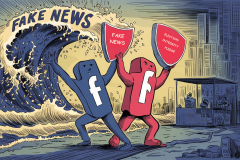
Pinterest is poised to dip an extremely cautious toe into the water of promoted pins. According to an announcement by Founder and CEO Ben Silbermann, the company plans to experiment with promoting pins from select businesses.
This move will be very different from last year’s Skimlinks debacle, in which Pinterest came under fire for not coming clean about monetizing pinners through affiliate links. “Nobody’s paying for anything yet,” wrote Silbermann. “We want to see how things go and, more than anything, hear what you think.” He also added that the pins will be “tasteful,” “transparent,” “relevant,” and influenced by users’ own feedback.
Given that last brush with monetization, it makes sense that Silbermann would be more careful this time. And more transparent.
In 2012, Pinterest users discovered on their own that the service had been manipulating their pins to make money through its partnership with Skimlinks, an automatic affiliate linking service.
Pinner and tech blogger Josh Davis first put two and two together: “I, like many people, don’t have a problem with Pinterest making money off of user content,” he wrote. “[But] Pinterest likely should disclose this practice to users even if they aren’t required to do so by law, if only to maintain trust with their users.”
The scandal drew criticism from the blogs and media outlets. Going straight to the source, Silbermann eventually called Davis in order to clear up, above all, that Pinterest had stopped using Skimlinks altogether.
See also: How Pinterest Added 70M Users Without Overhauling Its Original Codebase
In an interview with ReadWrite earlier this year, Jon Jenkins, Pinterest’s head of engineering, said the company wasn’t in any hurry to make money. “We’re extremely fortunate to be well funded right now,” he said. “It gives us to time to do this correctly. We don’t feel the pressure to monetize unnaturally.”
In fact, with Pinterest currently working through $200 million round in funding from February 2013, there’s no reason to believe this new announcement will be anything like a quick grab for profit.
And this time around, Pinterest is taking pains not to make the mistakes of last year. The process seems to be slow, and above all, transparent with users.
Illustration courtesy of Pinterest.










